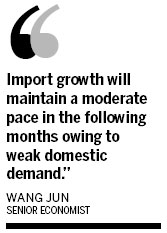China's trade climbs in Sept
Updated: 2012-10-14 07:47
By Li Jiabao(China Daily)
|
|||||||

China's exports significantly expanded in September while imports resumed growth after a decline in August, suggesting a recovery in overseas markets and a moderate improvement of domestic demand amid a bottoming-out in the world's second largest economy.
Economists and analysts are still cautious about China's foreign trade outlook owing to the medium and long-term pressure from the festering EU debt crisis and worrisome fiscal outlook in the US despite improvement in overseas demand.
China's exports increased by 9.9 percent in September from a year earlier, a record monthly high and much higher than the 2.7-percent growth in August. Imports, meanwhile, stepped out of the 2.6-percent fall in August, registering a gain of 2.4 percent in September, according to data from the General Administration of Customs on Saturday.
Total foreign trade in September grew by 6.3 percent year-on-year while the trade surplus widened to $27.67 billion from $26.7 billion in August.
Foreign trade from January to September went up by 6.2 percent from a year earlier with exports rising 7.4 percent and imports gaining 4.8 percent, yielding a trade surplus of $148.31 billion.
"The full year is likely to see a trade surplus of over $200 billion," said Wang Jun, a senior economist with China Center for International Economic Exchanges.
"Trade figures of September are relatively satisfactory. China's exports in the coming two or three months will keep up the momentum as the manufacturing index [also known as the purchasing managers index, or PMI] improves in the US and EU, in addition to Christmas demand and the central government's measures to boost China's foreign trade," Wang said.
The State Council introduced a raft of measures in September to stabilize trade growth, including speeding up export tax rebates, reducing administrative costs for companies, lowering financing costs for small and micro-sized enterprises and increasing credit to exporters.
Yi Gang, deputy governor of the People's Bank of China, said on Friday that the easing monetary policies introduced by the developed economies, including the US and the EU, boosted their demand and benefited exports of emerging economies while warning against the risk of inflation.
"Import growth will maintain a moderate pace in the following months owing to weak domestic demand," Wang added.
China's GDP growth will be 7.4 percent in the third quarter, a seventh straight quarterly slowdown, and 7.6 to 7.8 percent in the fourth quarter, and the whole year will see economic growth of 7.8 percent, according to Wang.
"The third quarter will probably be the bottom for China's economic growth slowdown and signs for the economic growth to step out of the bottom are taking place," Wang said.
The National Bureau of Statistics is scheduled to release third-quarter data for economic growth, industrial production and fixed-assets investment on Thursday.
China's purchasing managers' index rose to 49.8 in September from 49.2 in August, an increase after four consecutive drops, according to the National Bureau of Statistics and the China Federation of Logistics and Purchasing on Oct 1. A reading below 50 indicates contraction, while one above that level indicates expansion.
"The ongoing spat with Japan over the Diaoyu Islands has impeded China's import growth in the past month as imports of key parts from Japan for domestic processing trade saw a significant drop," Wang said.
Zhu Baoliang, a researcher from the State Information Center, said that imports in the coming months will see faster growth because of "a price surge of commodity goods and an inventory adjustment of domestic enterprises are basically finished".
Trade with the EU, China's largest trade partner, fell 2.7 percent year-on-year to $410.99 billion in the past nine months, while trade with the US, the country's second-largest trade partner, increased 9.1 percent to $355.42 billion, according to the customs administration. Meanwhile, China's trade with Japan dipped 1.8 percent to $248.76 billion, faster than the 1.4 percent decline recorded in the first eight months.
"China's foreign trade still faces pressure in the medium and long term because unemployment continues to trouble the US economic recovery," said Chen Hufei, a researcher from the Bank of Communications, who added that a real demand recovery in the eurozone is not expected soon.
"October will probably see a single-digit export growth because of the slow recovery of global economy, rising costs at home, and frequent trade friction during the US presidential election. In addition, the (immediate) outlook for China's exports to Japan is not optimistic," Chen said.
lijiabao@chinadaily.com.cn
(China Daily 10/14/2012 page2)